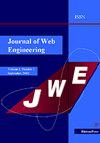用于用户偏好挖掘的联邦潜在Dirichlet分配
IF 0.7
4区 计算机科学
Q4 COMPUTER SCIENCE, SOFTWARE ENGINEERING
引用次数: 0
摘要
在Web服务计算领域,最近的一个需求趋势是在创建Web服务组合时根据用户需求挖掘用户偏好,以满足全面且不断发展的用户需求。潜在狄利克雷分配(LDA)等机器学习方法已被应用于用户偏好挖掘。然而,训练高质量的LDA模型通常需要大量的数据。随着政府法规的普及和人们隐私保护意识的增强,在中央服务器上收集用户数据的传统方式不再适用。因此,有必要设计一种隐私保护方法来训练LDA模型,而不需要大量收集或泄露数据。在本文中,我们提出了新的联合LDA技术来学习Web服务生态系统中的用户偏好。在用户级分布式LDA算法的基础上,我们建立了两个负责两层训练场景的联邦LDA模型:用于同步场景的集中式同步联邦LDA(CSFed-LDA)和用于异步场景的去中心化异步联邦LDA。在以前的CSFed LDA模型中,开发了一种基于重要性的部分同态加密(IPHE)技术,以有效地保护隐私。在后一种DAFed LDA模型中,引入了区块链技术,并设计了一种基于多通道的权限控制方案(MCACS)来增强数据安全性。在真实世界的数据集ProgrammableWeb.com上进行的大量实验已经证明了我们方法的模型性能、安全保证和训练速度。本文章由计算机程序翻译,如有差异,请以英文原文为准。
Federated Latent Dirichlet Allocation for User Preference Mining
In the field of Web services computing, a recent demand trend is to mine user preferences based on user requirements when creating Web service compositions, in order to meet comprehensive and ever evolving user needs. Machine learning methods such as the latent Dirichlet allocation (LDA) have been applied for user preference mining. However, training a high-quality LDA model typically requires large amounts of data. With the prevalence of government regulations and laws and the enhancement of people's awareness of privacy protection, the traditional way of collecting user data on a central server is no longer applicable. Therefore, it is necessary to design a privacy-preserving method to train an LDA model without massive collecting or leaking data. In this paper, we present novel federated LDA techniques to learn user preferences in the Web service ecosystem. On the basis of a user-level distributed LDA algorithm, we establish two federated LDA models in charge of two-layer training scenarios: a centralized synchronous federated LDA (CSFed-LDA) for synchronous scenarios and a decentralized asynchronous federated LDA (DAFed-LDA) for asynchronous ones. In the former CSFed-LDA model, an importance-based partially homomorphic encryption (IPHE) technique is developed to protect privacy in an efficient manner. In the latter DAFed-LDA model, blockchain technology is incorporated and a multi-channel-based authority control scheme (MCACS) is designed to enhance data security. Extensive experiments over a real-world dataset ProgrammableWeb.com have demonstrated the model performance, security assurance and training speed of our approach.
求助全文
通过发布文献求助,成功后即可免费获取论文全文。
去求助
来源期刊

Journal of Web Engineering
工程技术-计算机:理论方法
CiteScore
1.80
自引率
12.50%
发文量
62
审稿时长
9 months
期刊介绍:
The World Wide Web and its associated technologies have become a major implementation and delivery platform for a large variety of applications, ranging from simple institutional information Web sites to sophisticated supply-chain management systems, financial applications, e-government, distance learning, and entertainment, among others. Such applications, in addition to their intrinsic functionality, also exhibit the more complex behavior of distributed applications.
 求助内容:
求助内容: 应助结果提醒方式:
应助结果提醒方式:


